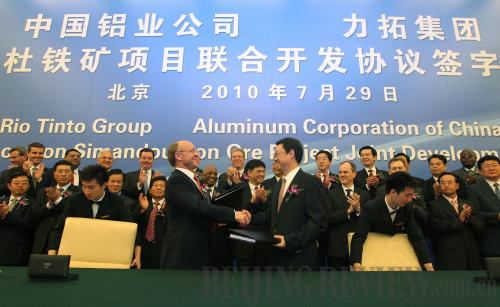|
 |
|
AFRICAN ORE AGREEMENT: Chalco Chairman Xiong Weiping and Rio Tinto Chairman Jan du Plessis shake hands after signing a cooperation agreement on developing and operating the Simandou iron ore project (CFP) |
More pressing, the Guinean Government has the option to acquire a 20-percent stake in the project—an option the Guinean Government has expressed a willingness to exercise. If it does so, the interests of Rio Tinto, Chalco and IFC will decrease accordingly, which means a dilution of Chalco's stake in the joint venture.
Shaky past
Chalco's parent company Chinalco and Rio Tinto have cooperated on numerous projects in the past—they've also butted heads a few times. The worst case might have been Rio Tinto's breach of contract with Chinalco last year when the former declined capital injection from the latter citing "government approval issues."
On February 12, 2009, Chinalco announced it had signed a strategic cooperation agreement with Rio Tinto, and that it would invest $19.5 billion in Rio Tinto by setting up a joint venture and purchasing convertible bonds issued by Rio Tinto.
Under the deal, Chinalco would buy $7.2 billion worth of bonds with a 9-percent interest convertible into Rio Tinto stock. Chinalco could change the bonds into stocks at any time within the stipulated conversion period. After the exchange, Chinalco would control an 18-percent stake in Rio Tinto, doubling its stake at that time. Chinalco would thereafter own 19 percent of Rio Tinto's UK company and 14.9 percent of Rio Tinto's Australian company. Also, Chinalco had the right to appoint two non-executive directors to Rio Tinto's board of directors.
In the meantime, Chinalco would pay $12.3 billion in cash for stakes in Rio Tinto's aluminum, iron ore and copper assets in the United States, Australia and Chile. The deal also said a joint venture would be set up where Chinalco would hold proportional chairs on the board of directors.
The 2009 deal also said Chinalco and Rio Tinto would cooperate in the Simandou iron ore project and mineral exploration in China to enhance their strategic alliance. Chinalco vowed to help Rio Tinto acquire financing in the Chinese market.
The deal was met with opposition from the Australian Government, and in June 2009, Rio Tinto officially rejected Chinalco's capital injection and paid Chinalco $195 million in fines for breaching the agreement.
Although the capital injection deal failed, the two companies expressed sincerity in cooperating in the Simandou project, and in March 2010 signed the memorandum on joint exploration for the Simandou project.
Xiong expects the two sides will regard cooperation on the Simandou project to be the foundation for future cooperation in other resource projects.
Aluminum Corp. China Ltd. (Chalco)
Chalco, established in China in 2001, is China's largest alumina and primary aluminum producer and the world's second largest alumina producer. It was listed on the New York Stock Exchange (NYSE) and the Hong Kong stock exchange on December 11 and 12, 2001, respectively. China's Aluminum Corp. of China (Chinalco) is the controlling shareholder of the company. Chalco has 10 branches, one research institute, and 12 subsidiaries.
(Source: www.chalco.com.cn)
Rio Tinto
Rio Tinto, established in Spain in 1873, is the world's second largest mining group headquartered in the United Kingdom, combining Rio Tinto Plc, a London and NYSE-listed company, and Rio Tinto Ltd., which is listed on the Australian Securities Exchange.
It has more than 60 subsidiaries around the world, and exports iron ore, copper, alumina, nickel, gold, borates, and titanium dioxides to China.
Rio Tinto takes the biggest market share in China among all iron ore producers and has set up offices in Beijing, Shanghai, Guangzhou and Hong Kong. It has ongoing mineral exploration projects in Xinjiang Uygur Autonomous Region, Gansu and Yunnan provinces to explore copper and nickel deposits. | 